Beau Biden’s death and the real crime of Boebert’s heckling. Could this finally be the reckoning for burn pits?
The issue of burn pits was given more airtime than voting rights, gun violence and abortion in Biden’s SOTU address. Two days later, the House passed sweeping burn pits legislation. Rachel Sharp hears from veterans, lawmakers and advocates about whether America’s sick and dying soldiers are finally being heard

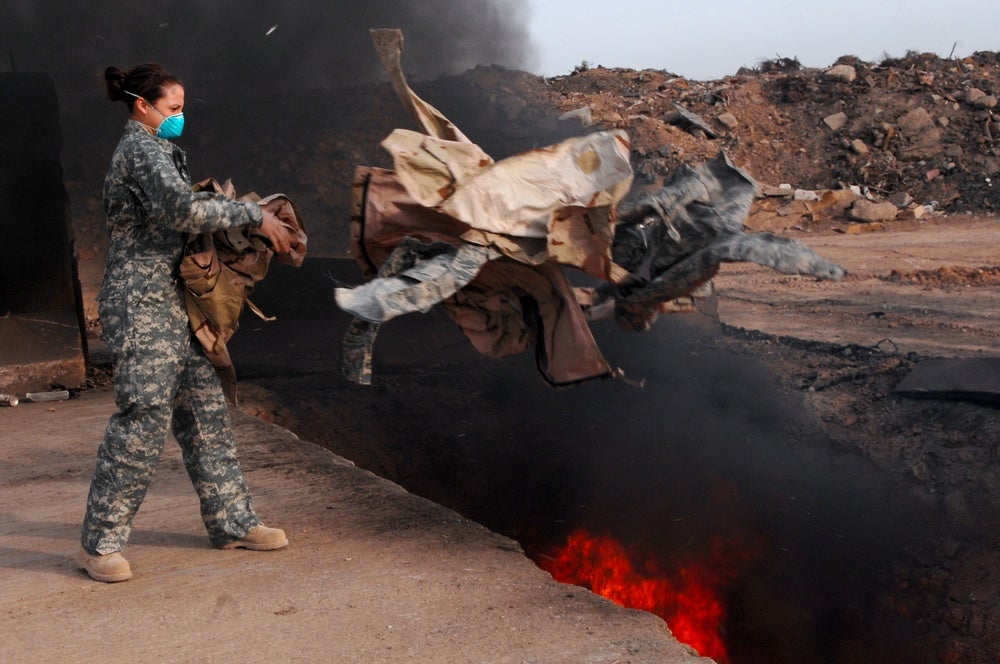
Your support helps us to tell the story
From reproductive rights to climate change to Big Tech, The Independent is on the ground when the story is developing. Whether it's investigating the financials of Elon Musk's pro-Trump PAC or producing our latest documentary, 'The A Word', which shines a light on the American women fighting for reproductive rights, we know how important it is to parse out the facts from the messaging.
At such a critical moment in US history, we need reporters on the ground. Your donation allows us to keep sending journalists to speak to both sides of the story.
The Independent is trusted by Americans across the entire political spectrum. And unlike many other quality news outlets, we choose not to lock Americans out of our reporting and analysis with paywalls. We believe quality journalism should be available to everyone, paid for by those who can afford it.
Your support makes all the difference.In the midst of a speech with a strong focus on Russia’s invasion of Ukraine, the US economy and some heckling from right-wing critics, the eyes of the nation turned to a woman sitting on the Senate balcony.
She stood and waved as US lawmakers gave her a standing ovation. She smiled shyly and gestured her thanks. She became visibly emotional and appeared to be trying to hold back tears.
Danielle Robinson was one of only a handful of people personally named in President Joe Biden’s State of the Union address on 1 March.
One of the others was her husband Heath.
A first class sergeant in the Ohio National Guard, Heath could not join his wife at the SOTU address because he died almost two years earlier from a rare cancer after being exposed to toxic fumes from burn pits during his deployment to Iraq.
His widow was invited to be First Lady Jill Biden’s guest at the SOTU.
“It was an honour to be there and to be the voice and face of other widows being affected by their loved ones dying from toxic exposure from war,” she told The Independent on 2 March.
“And a lot of people were celebratory of the night. But it was also a very sombre time for me as I’m only there because my husband passed away.
“So part of me was happy because it was an experience of a lifetime but the whole reason I was invited was because of my experience of something very traumatic.”
Veterans and advocates who have been pushing for years for lawmakers to take the issue of burn pits seriously told The Independent earlier this year that they wanted Mr Biden to speak about it in his SOTU address.
They told how the previous administration refused to even recognise that there was a link between the burn pits and the conditions thousands of veterans have been suffering from - despite the mounting evidence.
On 1 March night, around 37 million Americans tuned in to watch Mr Biden deliver his first SOTU.
And the president devoted a significant proportion of the address to the topic - giving it more airtime than other major issues including voting rights, gun violence and women’s reproductive rights.
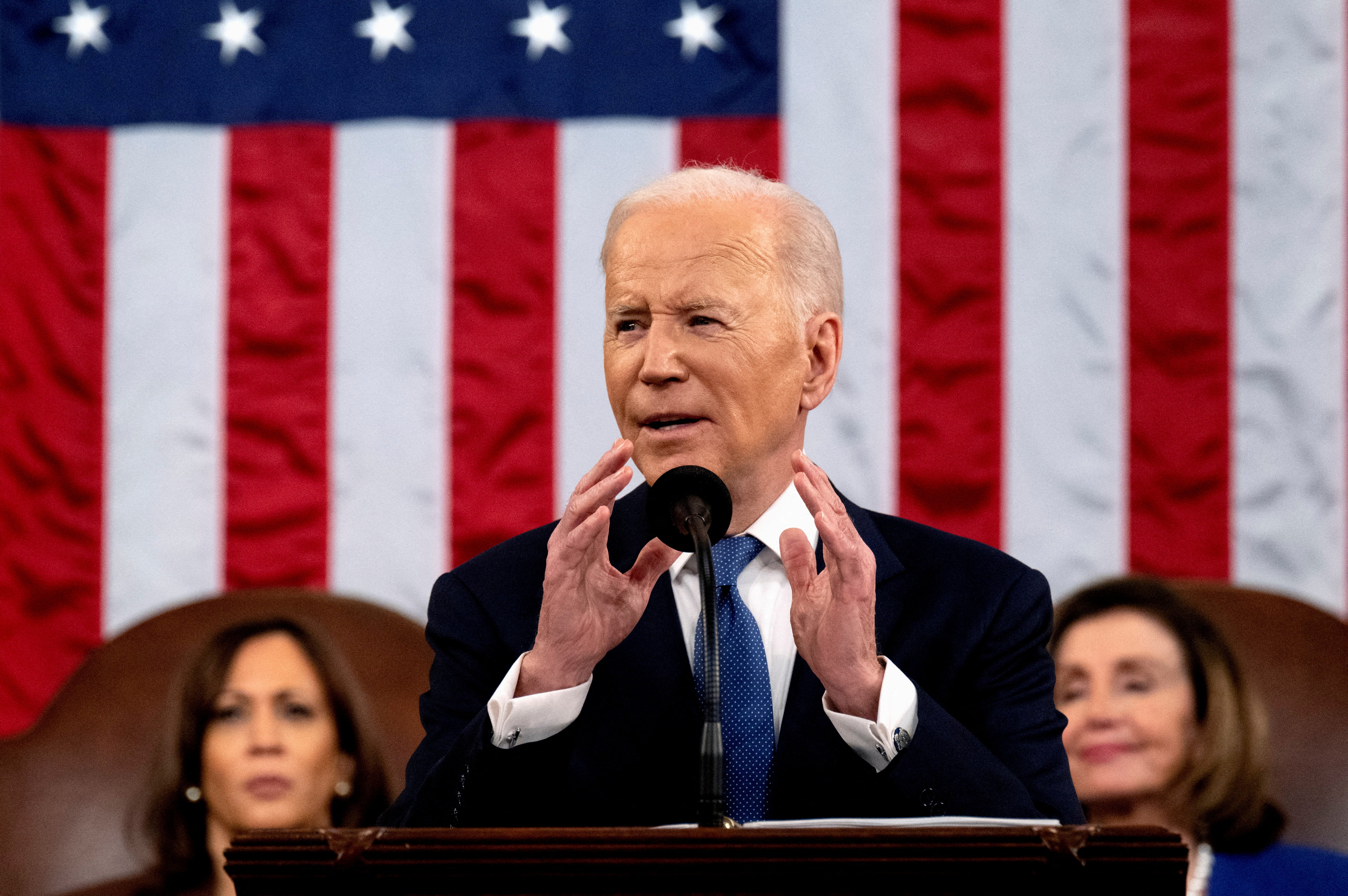
He spoke about how his son Beau Biden died from a rare cancer he now believes may have been caused by his exposure to burn pits on deployment to Kosovo and then Iraq.
He also made the announcement that nine respiratory cancers will be added to the Veteran Affairs’ (VA) list of illnesses that will be presumed to have been caused by burn pits exposure.
He then called on Congress to pass legislation to ensure veterans who are sick and dying from toxic exposure “finally get the benefits and the comprehensive healthcare they deserve”.
“Our troops in Iraq - and Afghanistan - have faced many dangers. One being stationed at bases, breathing in toxic smoke from burn pits. Many of you have been there. I’ve been in and out of Iraq and Afghanistan over 40 times,” he said.
“These burn pits that incinerate waste - the wastes of war, medical and hazardous material, jet fuel, and so much more.
“And they come home - many of the world’s fittest and best trained warriors in the world - never the same: headaches, numbness, dizziness, a cancer that would put them in a flag-draped coffin. I know.
“One of those soldiers was my son, Major Beau Biden. I don’t know for sure if the burn pit that he lived near - that his hooch was near in Iraq and, earlier than that, in Kosovo - is the cause of his brain cancer and the disease of so many other troops.
“But I’m committed to find out everything we can.”
‘The week we’ve all been waiting for’
The timing was significant, coming less than 48 hours before the House voted on the most comprehensive legislation put forward to date for veterans suffering conditions related to burn pits.
The House passed the bipartisan Honoring Our PACT Act on 3 March. Three months later the legislation moved one step closer to passage in the Senate after a successful cloture vote on 7 June.
If it passes the Senate, the law will ensure veterans with 23 cancers, respiratory illnesses and other conditions after being exposed to burn pits on deployment overseas are granted automatic access to VA healthcare.
As Rep. Mark Takano said in a 2 March morning rally alongside House Speaker Nancy Pelosi and other lawmakers backing the bill, prominent members of the veteran community, and veteran advocates including comedian Jon Stewart and 9/11 first responder John Feal: “This is the week we’ve all been waiting for.”
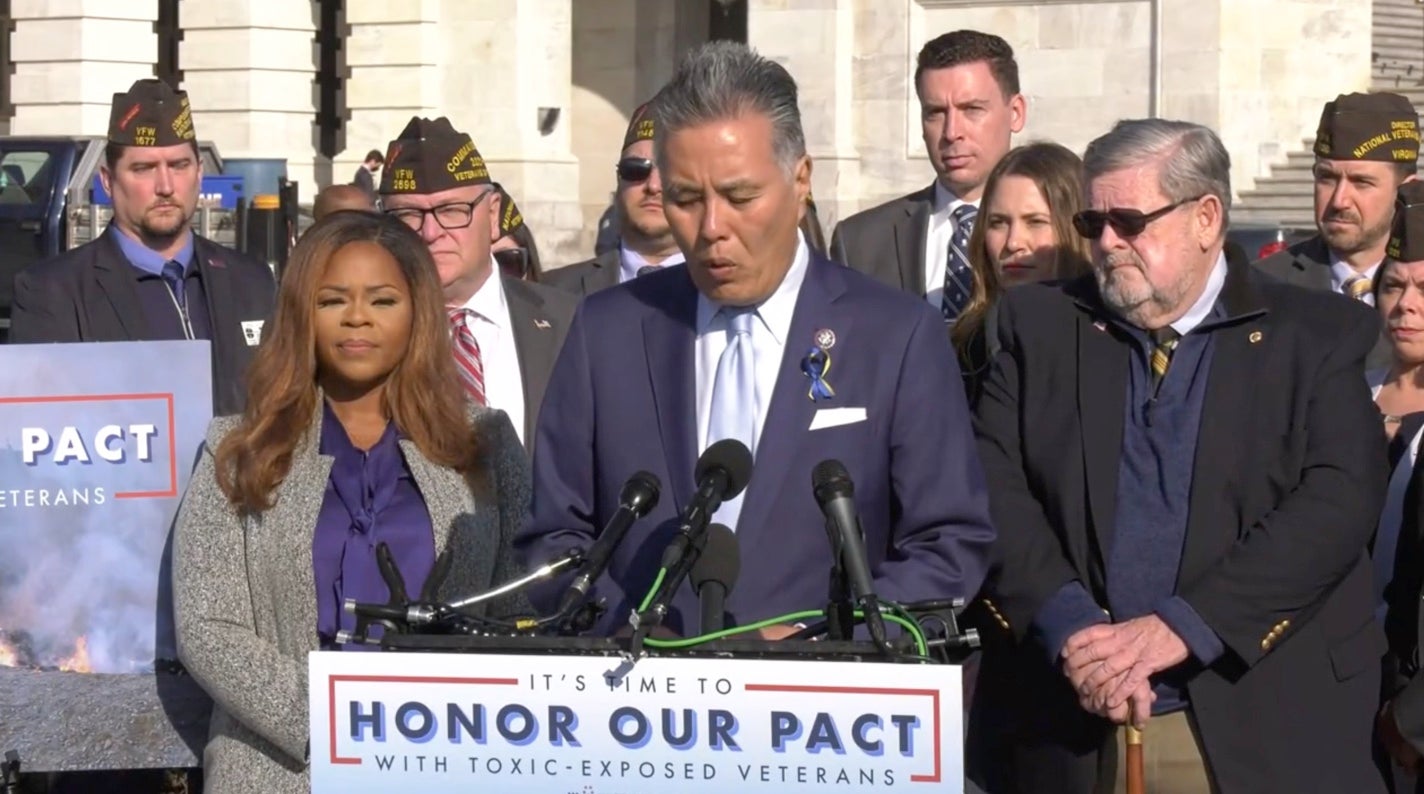
During America’s post-September 11 wars, huge open-air burn pits were used to dispose of mountains of trash including food packaging, human waste, military equipment and everything else on bases in Iraq and Afghanistan.
After being exposed to the toxic fumes released from the pits day in, day out on deployment, thousands of soldiers returned home and developed health conditions including rare cancers, lung conditions, respiratory illnesses and toxic brain injuries.
A staggering 3.5m servicemembers and veterans have been exposed to burn pits and airborne toxins while serving the US overseas, according to VA estimates.
But, due to the burden being on the veteran to prove their illness is directly caused by this toxic exposure, the VA is approving only around one in five claims for disability benefits where burn pits are cited - leaving many veterans sick and dying without access to the healthcare or benefits they deserve.
Heath was deployed to Iraq in 2006 and 2007 as a member of the Ohio National Guard.
As a highly-decorated soldier twice recognised by the Guard, Ms Robinson said he was the type of person who would get up in the morning to help his fellow soldiers with their PT tests or to decorate the armoury to make it nicer for his comrades.
In 2016, he started having nosebleeds.
The next year, he was diagnosed with a rare autoimmune disease before receiving his cancer diagnosis soon after.
“When we went to the cancer centre in Columbus, Ohio, the doctor’s words were ‘what have you been exposed to? I’ve only seen this when people have been exposed to toxic substances’,” said Ms Robinson.
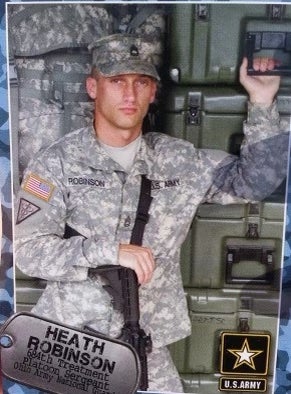
Biden shared Heath’s story with lawmakers and the American people in his State of the Union address.
“He was born a soldier, Army National Guard, combat medic in Kosovo and Iraq. Stationed near Baghdad, just yards from burn pits the size of football fields,” he said.
“Danielle is here with us tonight. They loved going to Ohio State football game. And he loved building Legos with their daughter. But cancer from prolonged exposure to burn pits ravaged Heath’s lungs and body.
“Danielle says Heath was a fighter to the very end. He didn’t know how to stop fighting, and neither did she.
“Through her pain, she found purpose to demand that we do better. Tonight, Danielle, we are going to do better.”
The president’s commitment to speaking about the issue didn’t go unnoticed by lawmakers and advocates who are calling for action.
Giving the issue airtime
Rep. Joaquin Castro, who is co-sponsoring the Honoring Our PACT Act, told The Independent that the SOTU speech was significant because it was possibly the very first time that some Americans have even heard of burn pits.
“That may be the first time many Americans are hearing about what burn pits have done to our service members so I’m glad he took the time to explain it and took the time to say why it is important for Congress to do something about it,” he said.
“I’m glad that the president is taking strong action to do right by veterans who suffered from burn pits exposure.
“They’ve waited a long time, they’ve often not been believed, and many have suffered. For some, it’s cost them their lives so it’s very overdue.”
Mr Castro described burn pits as “this generation’s Agent Orange” - a toxic herbicide used by US troops during the Vietnam War which left many soldiers sick on their return home.
“It took Vietnam veterans years to be believed and treated,” he said of Agent Orange.
“And it’s taking veterans suffering because of burn pits years to be taken seriously and to be treated so [Biden’s speech] was a big step towards doing right by veterans of this generation.”
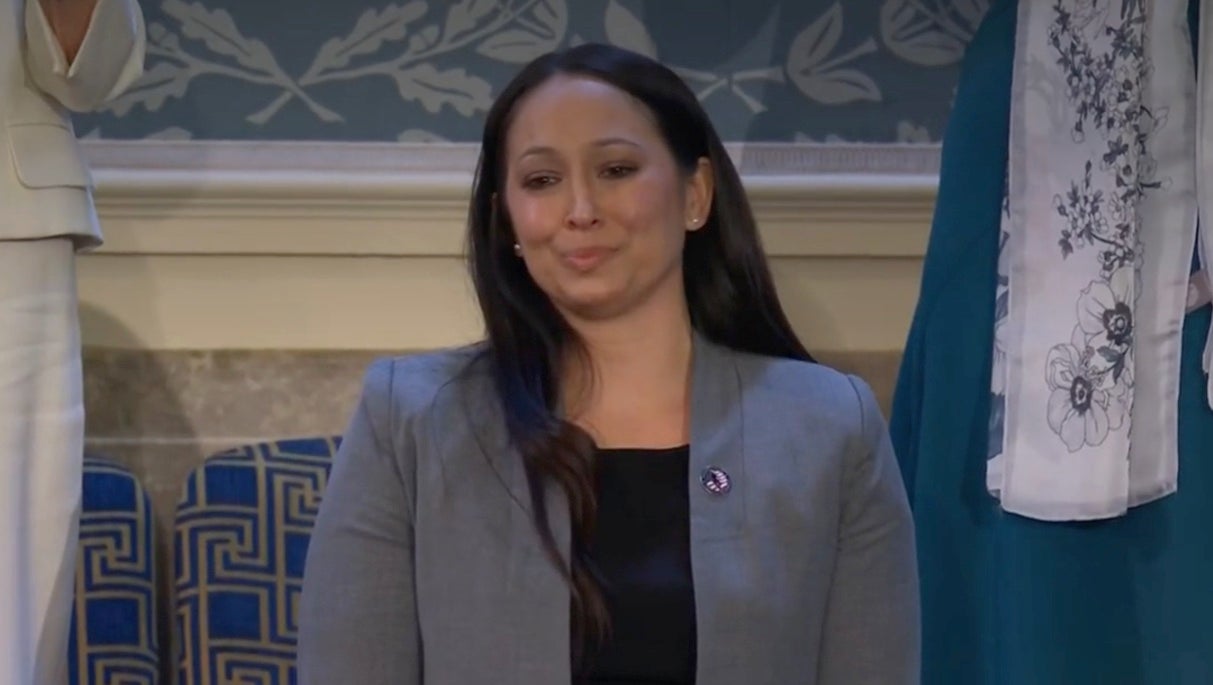
The length of time the president gave to the issue in the SOTU was especially “remarkable”, said Rep. Raul Ruiz, who also cosponsors the legislation.
“I think it was remarkable the amount of real estate and time he gave to burn pits during the State of the Union address,” he told The Independent.
“It’s the address that prioritises the issues for Congress and for the nation and so to even get a couple of inches of a president’s SOTU speech… and he gave a lot more than that.
“And not only that, he personalised it. The president is a father of a veteran who died from brain cancer after serving at Balad Air Force Base in Iraq and being exposed to burn pits.
“So he understands the families that have lost loved ones - the wives, husbands, sons, daughters, parents.”
Making it personal
Ms Robinson revealed that both the president and the first lady were “very emotional” when they greeted her in DC ahead of the SOTU and that it was clear this is something close to their hearts.
“The First Lady didn’t know what to say to me at first when she saw me. They were very emotional,” she said.
“It hits them hard as they’ve experienced the same story as me and my husband.
“They told me they are behind the issue and told me not to give up fighting.”
Mr Biden has spoken in the past about how he believes the aggressive brain cancer that killed his son may be linked to his exposure to burn pits.
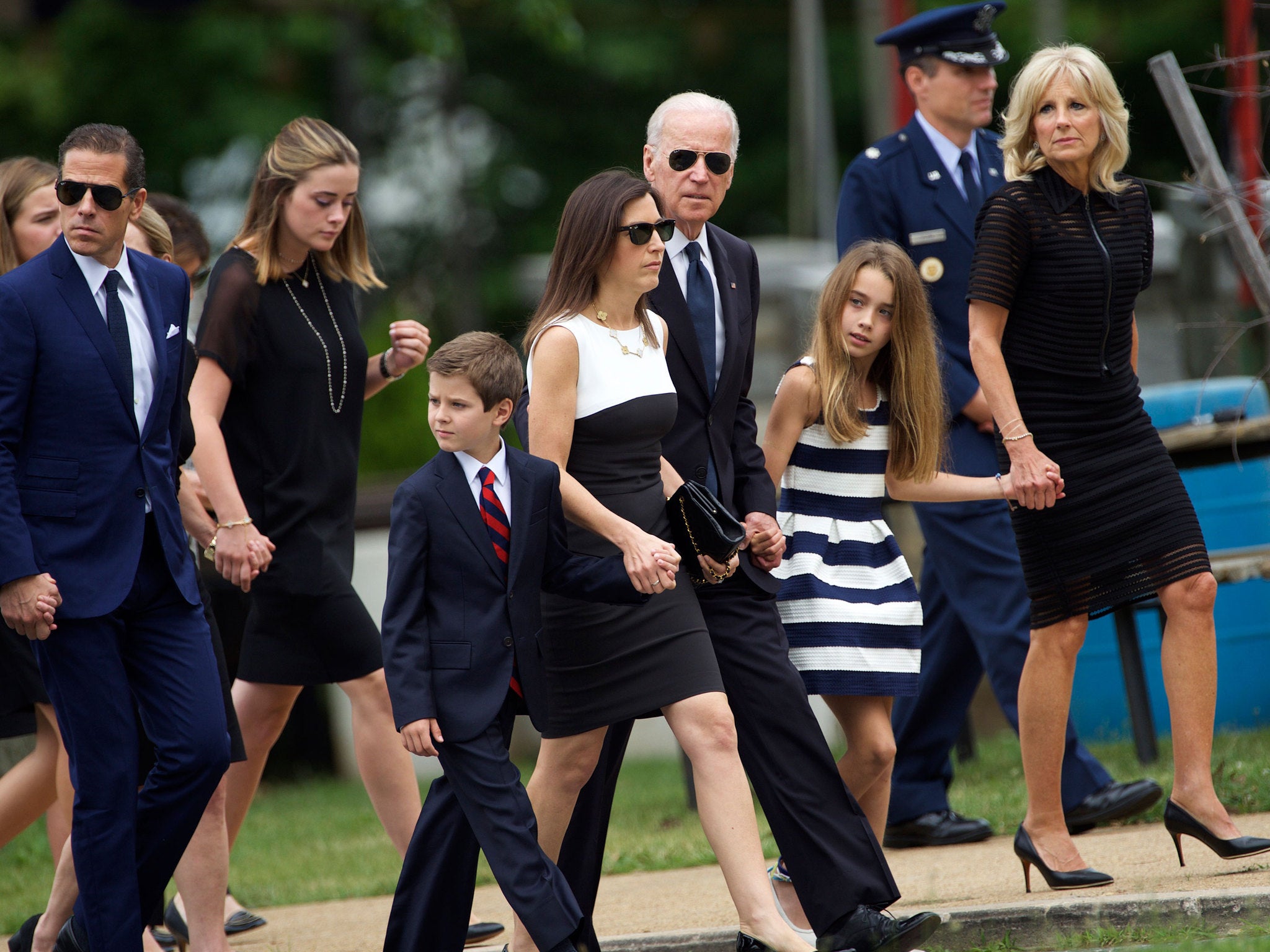
But, for veterans listening on 1 March, his speech marked his most direct and confident assertion on the matter to date.
“I believe he was more direct with it than he ever has been,” Le Roy Torres, a veteran of 23 years and cofounder of burn pits advocacy group Burn Pits 360, told The Independent.
“It was the huge puzzle coming together.
“I believe in my heart that [Beau’s illness] was caused by toxic exposure. With the data out there, there’s no doubt in my mind that it was burn pits-related and so for him to say that at the State of the Union is big progress.”
A decade long fight
Mr Torres was deployed to Iraq in 2007 and began suffering breathing issues when he returned.
In 2010, he was diagnosed with constrictive bronchiolitis - a rare form of lung cancer caused by toxic exposure - and later toxic brain injury.
He has spent the last 12 years fighting for the US government to provide veterans sick from burn pits the same access to healthcare that it does to veterans suffering from other war wounds.
Mr Torres was invited to the SOTU as Rep. Castro’s guest, an invitation that - together with Mr Biden’s speech - was proof of how far the veteran community has come in this fight.
“In 2021, we saw the wheels starting to move much faster. Then to receive this email inviting me to the State of the Union was definitely a moment of reflection and gratitude for the headway and how far we have come,” he said.
“It’s been 12 years. It’s a tremendous change. After I left the hospital back in 2010 I remember being so disappointed as the VA was just trying to hide the issue and sweep it under the rug and DC wasn’t being receptive.
“12 years later, it’s finally getting the national attention that we’ve worked so hard for for more than a decade. Last night was the punch moment of hope.”

The president’s speech certainly “pumped new energy” into veterans, advocates and lawmakers as they held a rally and press conference on Capitol Hill on 2 March to urge the House to pass the PACT Act, said Mr Feal.
The 9/11 survivor who pushed Congress to ensure first responders at Ground Zero get permanent healthcare is now an advocate for veterans suffering from toxic exposure to burn pits.
“What the president said last night was uplifting, positive and it pumped new adrenaline into this group behind me,” he said in the press conference.
However, he added that “they’re just words, just words and it’s up to us to act on them”.
Speaking to The Independent, he praised the president for “moving the goal lines for us” but said he would “like to see more”.
“What [the president] said and did was heard by America and veterans support it and we will get the legislation passed,” he said.
“If I had to sum up his speech I’d say powerful and on point about burn pits - but it also dictated that we have more work to do.”
The nine respiratory conditions are: squamous cell carcinoma of the larynx, squamous cell carcinoma of the trachea, adenocarcinoma of the trachea, salivary gland-type tumors of the trachea, adenosquamous carcinoma of the lung, large cell carcinoma of the lung, salivary gland-type tumors of the lung, sarcomatoid carcinoma of the lung, and typical and atypical carcinoid of the lung.
Noticeably absent from the list is constrictive bronchiolitis - the rare condition that Le Roy and other veterans who previously spoke to The Independent have and which doctors say can only be caused by toxic exposure.
Glioblastoma - the brain cancer Beau Biden had - is also missing.
Ms Robinson said that, despite her invite to the SOTU, her husband’s cancer also didn’t make the list.
This means that, almost two years on from his death, his condition is still not covered by the VA.

“The problem is that right now we have presumptions for diseases that are not terminal and what President Biden announced last night with the nine cancers - those are only going to cover a few hundred soldiers as it’s not the more common cancers that have been linked to toxic exposure,” she said.
“So the announcement of those nine cancers was great for the veterans that will qualify for that but it still leaves out a very large portion of the veteran population so it’s not good enough.”
Last year, the VA also added three respiratory conditions to the presumptive list, which the veteran community described as “political breadcrumbs” but a sign of good faith that the Biden administration was taking the issue seriously.
While veterans and advocates are similarly underwhelmed by these newest additions, they agreed that it is a “step forward” and a well-timed move from the president toward passing the far more comprehensive PACT Act, which they believe will bring real change.
“It’s almost like divine intervention. The timing was almost perfect to move forward with the vote on the bill,” said Mr Torres.
“Especially for President Biden to have spoken about losing a loved one - that should hit the hearts of Congress.”
Passing the PACT Act
Now, it’s important to use the momentum and focus the president has placed on the issue this week to get the bill passed into law, Rep. Ruiz said.
“It is crucial that we pass this now in Congress and keep building the momentum to get it to pass in the Senate and then a bill can be sent to the president’s desk to sign that includes presumptive illnesses from toxic exposure to burn pits and also ensures the burden of proof is no longer on the shoulders of veterans,” he said.
“We cannot waste the momentum or energy as widows and sons and daughters of deceased veterans have been waiting for this moment for so long.
“It may be too late for some but it’s not too late for the veterans who are dying.”
During the House vote on 3 March, several eyes were trained on Rep. Lauren Boebert after she heckled Mr Biden in the middle of his comments on SOTU.
“You put them there - 13 of them”, the Republican congresswoman shouted at his mention of veterans coming home in coffins - an apparent reference to the 13 soldiers who died during the US’s withdrawal from Afghanistan last year.

She was met with boos from her fellow lawmakers and has been widely condemned in the aftermath over the timing of her interruption.
Ms Robinson branded the congresswoman “disrespectful” to soldiers who died serving their country and said she should no longer be allowed in Congress.
“That was very disrespectful to all those who gave their life to this country,” she said.
“It was so disrespectful. It was a slap in the face. We shouldn’t have her sitting on the House floor.”
Rep. Ruiz said that, in that moment, Rep. Boebert was heckling sick and dying veterans and their families too.
“We’re talking about such a solemn issue - veterans dying from exposure to burn pits while serving in wars and you have thousands of families out there who have gone through a similar experience to the president of the United States and then you have somebody heckle the president,” he said.
“It is very disrespectful and I’m sure that families felt that they were being heckled in that moment as well.”
Mr Torres said that he would be “surprised” to see Rep. Boebert on board with the bill following this “painful” behaviour.
He was right. The Republican congresswoman voted against the passage of the bill that will provide access to healthcare and disability benefits for veterans dying because of their service to their country.
Even without her support, the bill - as expected - passed the House with some bipartisan support, as 34 Republicans joined all the House Democrats in approving it.
It’s when it reaches the Senate that supporters are less confident. The Senate has its own version of the bill but the veteran community feels it is nowhere near substantial enough.
Mr Feal said that passing the legislation and supporting veterans should not be a partisan issue.
“The military is a sacred thing and Republicans and Democrats can both get on board with the issue that military members are sick and dying,” he said.
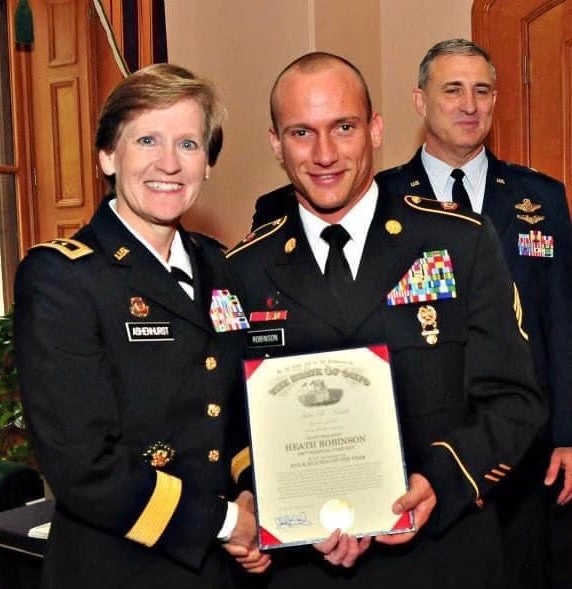
“And those who go against it in the House or the Senate are silly and we won’t pay attention to them.”
Mr Torres called on all lawmakers to “honour their oath when they took office” and vote in favour of the bill.
“Veterans answered the call and honoured their oath to serve the country,” he said.
“How about you honour your oath when you took office and support this issue?”
For Ms Robinson, while it may be too late for her husband to get the support from the government he deserved, she said it doesn’t need to be for other veterans and their families.
“People say never leave a soldier behind in war. But America is leaving soldiers behind all the time,” she said.
“This has been going on long enough.”
This story was originally published on 3 March 2022 and has been updated.



Join our commenting forum
Join thought-provoking conversations, follow other Independent readers and see their replies
Comments